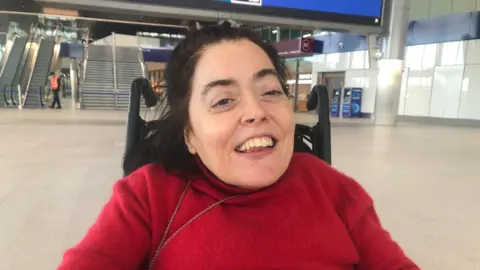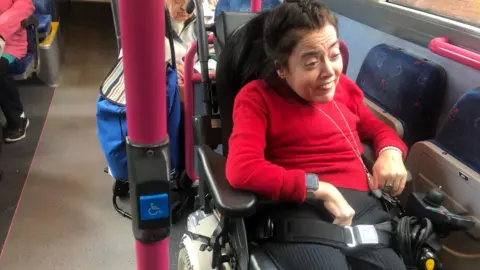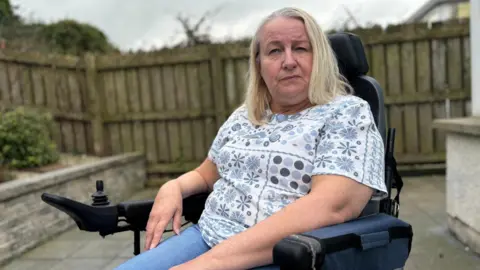
“Once I had to miss two buses before I could actually get on because of prams.”
Joanne Sansome has cerebral palsy and uses a motorised wheelchair daily.
She told BBC News NI that for people living with disabilities, accessing public transport is not always easy.
Before the ramps on buses were changed to manual operation, Joanne said she had issues where the automatic function was broken and she had to be lifted off the bus.
While most trains and buses in Northern Ireland are now wheelchair-accessible, she explained she rarely uses them, instead relying on her parents for transport.
In a statement, a Translink spokesperson said it was “committed to providing convenient, safe and accessible services for everyone”.

Joanne said she used to regularly travel by bus, but had to stop when she began experiencing “more and more difficulties”.
“Sometimes when you get on the bus, there’s people with children in prams, and sometimes they’re reluctant to fold the pram up and give you the wheelchair space, and that means you have to wait for the next bus.”
“In a way, I am lucky because both of my parents are now retired, so I’ve started using them as opposed to getting a taxi or a bus,” Joanne said.
‘Undignified experience’

Caroline Dorsett, who lives in Portrush, uses public transport at least once a week but said it can be a “quite undignified” experience for wheelchair users.
She told BBC News NI she was had once been left “stranded in Coleraine” because the wheelchair space on the bus was taken by someone travelling with a pram.
“Drivers do their best, but if somebody refuses to move, you can’t get on,” Caroline said.
“If you manage to get on a bus, you’re then negotiating into a space.
“Usually there’s little seats at the side, so you’re trying to put those up and get into the space, but when I eventually park, I have to face the rest of the passengers rather than the front, so you’ve got that audience.
“If there are other passengers with buggies or other mobility equipment, they sometimes try and squeeze it in in front of you, and you can’t get off the bus.
“For me, if I didn’t have to use the bus, I wouldn’t.”
While all of Translink’s bus and rail carriages in Northern Ireland are accessible, not all have low floors to make it easier for wheelchair users to get on from the pavement.
Goldline coaches operate with side lifts.
Caroline told BBC News NI that the challenges could sometimes be worse for people living in rural areas.
“If I want to guarantee a spot on the bus, then I have to ring first to see if I can get on because if there’s a wheelchair already on the bus, I can’t get on, which leaves me sitting at a bus stop without any shelter,” she said.
“Nobody else needs to do that, and we just want the same as everyone else.”
She added that the infrequency of buses in rural areas also left wheelchair users at a disadvantage compared with cities or bigger towns.
The latest statistics from the NI Statistics and Research Agency show people with mobility difficulties made an average of 519 journeys in 2021 – 44% less than those without a mobility difficulty.
Translink said it had begun rolling out a new fleet of buses with separate spaces for wheelchair users and prams, adding that staff have undergone training as part of its accessibility programme.
A spokesperson said it worked with organisations like Inclusive Mobility and Transport Advisory Committee (IMTAC), Royal National Institute of Blind People, Guide Dogs NI and others to ensure its services were a “welcoming space for those with physical and hidden disabilities”.
IMTAC said it had been raising concerns with Translink’s procurement policies for well over a decade, but that progress was being made.
Joanne said she did recognise that work was being done to make transport more accessible for people with disabilities.
She added: “It’s nice to be independent and free and I’m excited that maybe Northern Ireland will come up to standard.”








